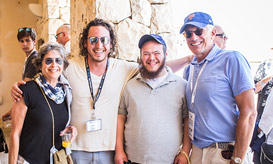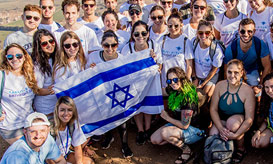On Tuesday, October 23rd Birthright Israel and Birthright Israel Foundation hosted an afterparty at the 2018…
Eighteen years and 650,000 happy participants later, you’d think people would get Birthright Israel right. Yet it’s amazing how many people get Birthright Israel wrong. Few understand Birthright’s secret sauce – what I call the Zen of Birthright. They expect it to be as site-oriented as a grand European tour, as partisan as a Zionist pep rally, as self-involved as most student’s freshman years, and as staged-managed as a video game. Not so.
Birthright Israel works well, because – surprise! – it’s countercultural. It’s insight-seeking not site-seeing; it’s non-partisan in a highly politicized age, it’s about community-building, emphasizing the “our” in tourism, not just the “i”; and it’s open and welcoming not authoritarian and programmatic.
That’s the beauty of Birthright Israel. In 1999, when Charles Bronfman and Michael Steinhardt announced this crazy idea to send young Jews to Israel for ten days for free, I wrote my first article ever in the Jewish media. I warned that if this was yet another guilt trip to be Jewish, yet another attempt to throw money at what they then called the “continuity problem,” and if all participants did was visit the Jewish vale of tears – the Western Wall, Yad Vashem and Masada — to wallow in our historic woes, the trip would fail. But, if this new program was ready to develop a new, inviting, inspiring, open, Zionist vision – or visions – for this generation of young Jews then it would succeed.
In the Jewish world, if you criticize one of two things happens. If you’re lucky, you’re demonized, then ignored, and you go on your merry way. If you’re unlucky, you have to take responsibility for your words. Before I knew it, I was chairing the first Montreal Birthright Israel Task Force, accompanying the first 200 Montrealers to Israel on Birthright in February 2000, then writing a follow-up article: “Birthright Israel why I was wrong.”
I had to see it up close to get Birthright Israel right. And I’m proud to say, after 18 years of volunteering with this organization – most recently chairing its education committee since 2010 – we continue to get it righter and righter!
Of course, the State of Israel is the star of every trip. Every day is packed as participants rush from site to site, from Jerusalem to Tel Aviv, from the Negev to the Golan. But, as Dr. Zohar Raviv, Birthright Israel’s International Vice President of Education says, we’re about insight-seeking not site-seeing. We don’t approach each place as yet another photo-opp but as a growth-opp, a chance to learn, explore, grow – not just check it off your bucket list. One of our great challenges is to slow down, to let participants stop, process, consider – and from there not just see Israel but start developing a vision of who they are, what this all “means to me.”
Connected to that, we must always remember that Birthright Israel offers “Israel 101,” a first step, inviting all participants to navigate their own Jewish journeys. Disrupting the trip for partisan purposes, left or right, would be self-defeating.
Birthright Israel is not about the Palestinians – neither fighting them nor defending them; it’s about the Jews, who we are, what our heritage is, where we come from, where we want to go.
Note the key pronoun “we” – not I. The program’s founding insight involved not just a free ticket to Israel, but a life-changing opportunity to take a communal trip to Israel. Every Birthright Israel trip features 39 co-stars – the fellow bus members – plus a handful of Israelis as part of the mifgash program. This essential Jewish message is profoundly counter-cultural: you’re not alone and you don’t “do Jewish alone.” You encounter your heritage and your homeland with a peer group. From there, you’re invited to see what kind of community you want to build.
Therein lies the final building block – beyond the letter “k” – from site-seeing to insight-seeking, the number 101, and the pronoun “we,” is the verb “invite.” Command-and-control Judaism won’t work for most participants. Most come wary of authority, suspicious of tradition. Birthright Israel offers gifts of a free trip, and a communal Israel experience with no strings attached. In golf terms, it tees up the ball, but encourages every participant to survey, strategize, set sights – and swing away.
Our English name – Birthright Israel – emphasizes our inclusiveness, our rootedness. It says to every young Jew: “You belong! You’re part of this amazing people. You’re connected to this extraordinary country. Take it or leave it.” Our Hebrew name Taglit – meaning experience-based revelation, – adds another dimension. It invites – again the key verb – participants to take this recipe of a Jewish state, a Jewish heritage, a Jewish community, and new Jewish experiences and, if they so choose, be open to their own, authentically-generated, Israel-inspired, communally-supported Jewish “aha” moment.
If they come open to that – as most do – most walk away transformed.
Together, Birthright Israel – means welcome, this is yours too, while Taglit calls you to see where your encounter, your fresh engagement with this old-new land, at once so ancient and so modern, so foreign yet so familiar, takes you.
Gil Troy is the author of The Age of Clinton: America in the 1990s. His forthcoming book, The Zionist Ideas, which updates Arthur Hertzberg’s classic work, will be published by The Jewish Publication Society in Spring 2018. Professor Gil Troy is a Distinguished Scholar in North American History at McGill University.













